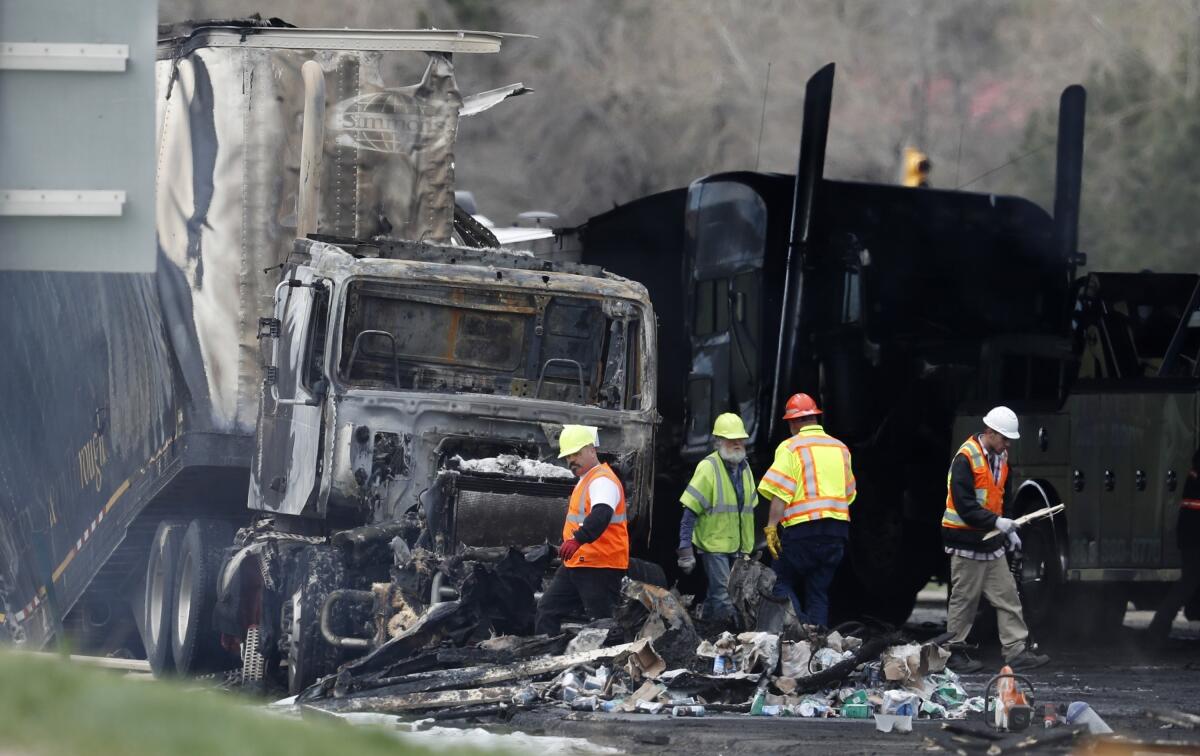A 110-year-sentence for a fatal truck crash is not justice

- Share via
There is something seriously wrong in Colorado.
That’s where a truck driver, Rogel Aguilera-Mederos, was recently sentenced to 110 years in prison for a 2019 highway collision that killed four people and injured six when his brakes failed and he unintentionally plowed his 18-wheeler into a line of cars stuck in rush-hour traffic on Interstate 70.
110 years.
There’s little question that Aguilera-Mederos was at fault. He was the driver, and a jury was apparently convinced that he knew or should have known that his brakes were smoking and not road-worthy when he got back into his truck and headed down the grade between the Rocky Mountains and Lakewood, a Denver suburb. He could have used an emergency lane when he knew his brakes had failed. He didn’t. His actions were foolish, reckless, negligent, stupid.
Prison time is the wrong response to the recklessness of a couple whose selfish gender-reveal antics caused the deadly El Dorado fire last year. But what kind of sanction is appropriate?
But not intentional.
He was found guilty on 27 counts including four counts of vehicular manslaughter and six counts of first-degree assault with extreme indifference.
Colorado has parole, but even so, Aguilera-Mederos, 23 at the time of the fatal collision, may be in his 80s before he’s released.
He should be held accountable, and perhaps incarceration has to be part of the resolution, but it’s hard to see what 110 years, or 50 years, or 15 or 10 would accomplish that, say, seven would not. That was the sentence imposed on a driver who lost control of his truck on Angeles Crest Highway in 2009, killing two people in a car before plowing into a bookstore in La Cañada-Flintridge. And yet even then, what did that prison time do for us? Warn other truck drivers to check their brakes?
There is something wrong with the law in Colorado if it compels a judge, as in this case, to hand down a sentence that he acknowledges is inappropriate and would not impose if he had a choice. The bind is a result of mandatory minimums adopted in the 1990s as part of a “tough on crime” movement to show the public that lawmakers and district attorneys were taking rising violence seriously. Colorado’s version requires that each sentence for each crime be served consecutively (although even if Aguilera-Mederos’ were served concurrently his term would still amount to more than a half-century in prison). The extraordinarily excessive sentence in this case is just one instance of fallout from that recent era of vengeance.
Retributive justice must play a role in the former Minneapolis police office’s sentence for murder. But it should not play the only role.
There is also something wrong with the prosecutors in Colorado — in this case, former 1st Judicial Dist. Atty. Peter Weir and his successor, Alexis King, who pursued the array of charges that resulted in a sentence that now even King appears to believe is excessive. Her office is seeking reconsideration.
Days earlier, she defended the decision to go for the long sentence by noting that prosecutors offered a plea bargain that Aguilera-Mederos wouldn’t accept. Does that mean she had no choice but to seek 110 years? She had every choice. Prosecutors decide what to charge and what sentence to seek. They use the threat of unconscionable sentences to leverage pleas from defendants. They then pursue those sentences to punish defendants for exercising their constitutional right to go to trial instead of entering a guilty plea.
Truckers are protesting the sentence, with many arguing that the real culprit is not the driver, but his employer, who is responsible for the failed equipment and for hiring people who, like Aguilera-Mederos, a green-card holder from Cuba, may not be proficient in English even though federal safety rules require them to be, to understand warning signs and to communicate with the public.
There have been protest marches. More than 4 million people have signed a petition seeking clemency. Kim Kardashian West has joined the fight on Aguilera-Mederos’ behalf. Thousands have taken to social media in outrage over two of the trial prosecutors exchanging a semitrailer brake shoe as a kind of victory trophy. The Denver Post editorial page has called on Gov. Jared Polis to consider a grant of partial clemency.
Clemency or commutation, in the form of substantial time off the shocking sentence, is certainly called for in this case, but even if it comes it would not fix the excessive sentencing laws, improperly used plea bargaining and overzealous prosecutorial culture. A governor’s power to grant relief from a sentence is a selective safety valve for criminal justice system failures. But clemency is not a substitute for even-handed, judge-mediated, law-and-reason-based justice in a well-balanced system that works.
There’s something wrong in Colorado, but it’s not alone. Most states, including California, also have excessive sentencing laws and prosecutors who seek trophies rather than justice. Voters in a number of jurisdictions are rightly fed up with the situation and have elected prosecutors who promise to exercise their discretion differently, to create a more just and equitable system rather than one intent on locking people up for the longest period of time for even unintentional acts. Both California and Colorado, and other states, have commissions reviewing tough-on-crime-era laws and offering suggestions for more balanced penalties. This is the right direction for the justice system. Let’s not slow the progress.
More to Read
A cure for the common opinion
Get thought-provoking perspectives with our weekly newsletter.
You may occasionally receive promotional content from the Los Angeles Times.








